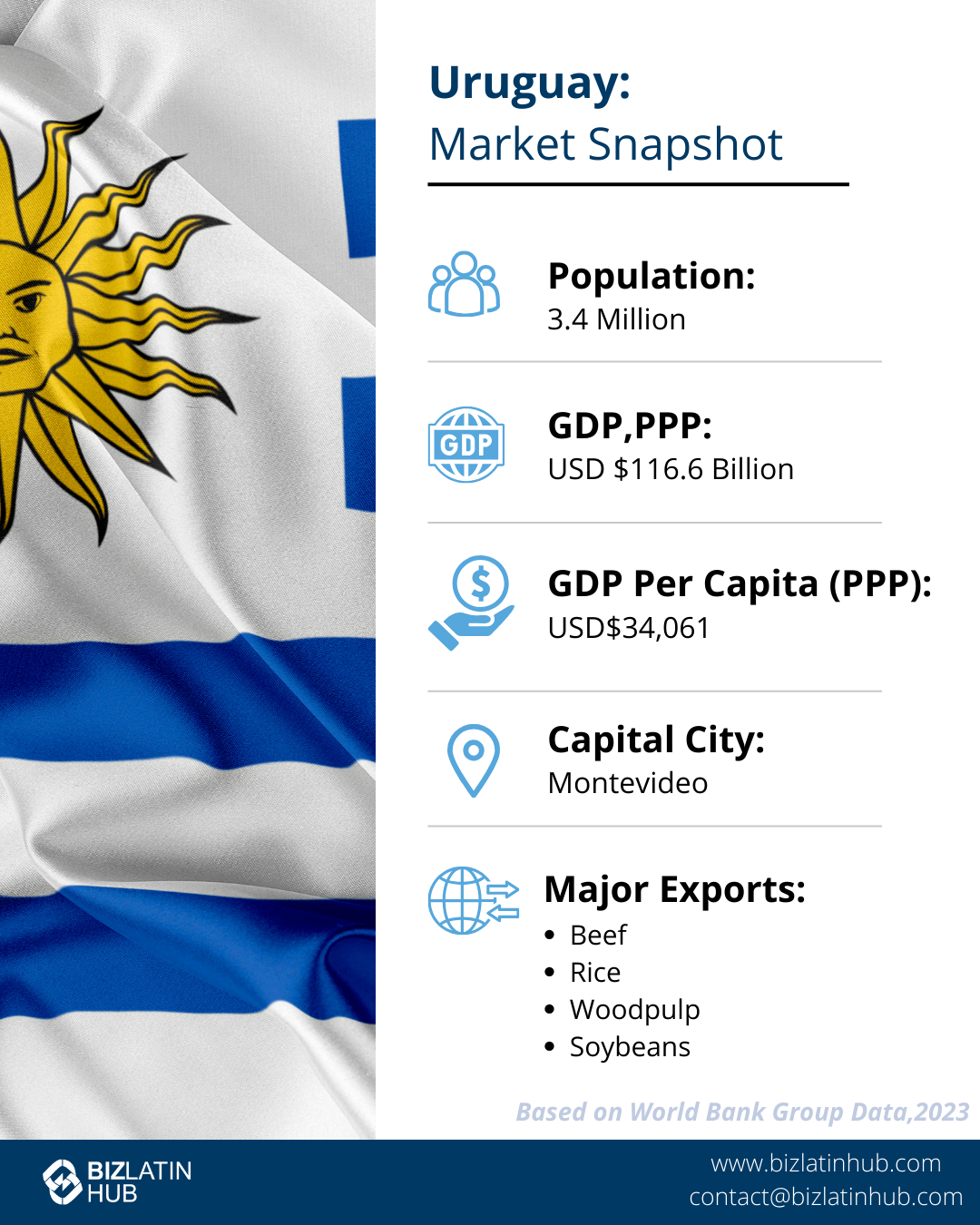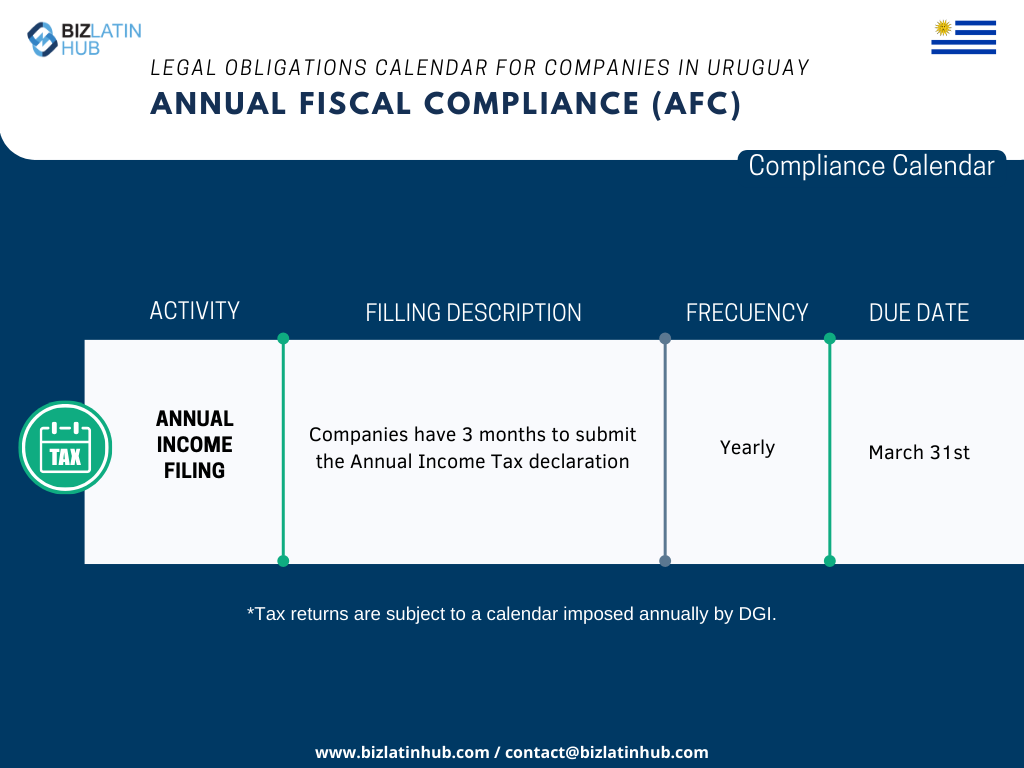Find out how to form an NGO in Uruguay and develop your social cause in a steadily developing country. In Uruguay, Law 17163 recognizes and regulates the existence of two types of non-governmental organizations (NGOs): Civil Associations and Foundations.
You are free to form an NGO in Uruguay of either type and both are non-profit organizations. However, they possess some regulatory differences, and impose different obligations on their owners. Understand the requirements for the constitution and subsequent operation, and make the right choice for your cause on the type you want to establish or whether you wish to register a business in Uruguay.
Biz Latin Hub can help you form an NGO in Uruguay, as well as support you throughout your company’s life cycle. Our array of market leading back-office services is here to make sure you stay fully compliant with both legal and fiscal obligations under local laws so that you can relax and focus on what you do best – running your organization.
Forming an NGO in Uruguay: Foundation and Civil Association
There are 2 types of NGO in Uruguay: the Foundation and Civil Association.
Foundation
Law 17.613 regarding NGOs in Uruguay establishes that “Foundations are legal persons recognized as such by the competent authority, which are constituted by the contribution of goods, rights or resources, carried out by one or more natural or legal persons and who pursue an object of general non-profit interest”.
Civil Association
There is no specific rule that defines or regulates Civil Associations. Article 21 of the Civil Code makes reference to this type of NGO in Uruguay.
Generally, speaking, Civil Associations are a voluntary, lasting,

The role of the Ministry of Education and Culture
Decree-Law 15.089 states that the Ministry of Education and Culture (MEC) will act as the comptroller and disciplinary body of these 2 types of NGOs in Uruguay.
The MEC manages the creation, operation, dissolution and liquidation of NGOs in Uruguay. Each NGO must create and present books of:
- Minutes of Assemblies
- Minutes of the Board of Directors
- Board of Directors and/or Mayor (this depends on the type of NGO)
- Cash Register of Members
- Attendance at Assembly.
Requirements to form an NGO in Uruguay
The process to form an NGO in Uruguay differs for both types of organization. Depending on the entity type and needs of your NGO, this process can take between 3-24 months.
Form a Foundation
To form a Foundation NGO in Uruguay, the following documentation must be submitted to MEC:
- Notarial evidence of the first copy of the deed of incorporation: this includes testimony of the notarized deed of the constitution, protocolized, or notarial testimony by an exhibition of will
- Accredit initial patrimony: to start a foundation you must have certain institutional patrimony. The minimum amount must be consulted with the MEC at the time of deciding its constitution
- Draft statutes, when not in the act of constitution
- Note addressed to the Minister requesting the approval of the statute and the recognition of the legal status, signed by the managers or representatives of the NGO
- Social documentation: The Books of the Board of Directors and the Mayor’s Office must be presented for approval by the MEC.
Forming a Civil Association
The following documentation must be submitted to MEC to form a Civil Association NGO in Uruguay:
- Notarial Evidence of the Minutes of the founding Assembly with the approval of the full statute that will govern the NGO
- Note addressed to the Minister requesting the approval of the statute and the recognition of the legal status subscribed by the President or the Secretary of the NGO
- Social Documentation: The Minutes of Assemblies, Acts of the Board of Directors, Mayor, Cash Register, Membership and Attendance at Assemblies must be submitted for approval by the MEC.

Seek specialist support
The legal framework for forming an NGO in Uruguay is complex, and requires individuals to be aware of their obligations and compliance requirements in the country when establishing their organization.
It is highly recommended to engage a local legal expert who can offer guidance and support through this process, and provide clear communications to you, the Ministry, and other institutions your NGO may be dealing with.
Some additional elements to consider include:
- The name of the NGO in Uruguay must be established in extenso
- Regarding the address, only the Department where the institution is located will be consigned
- The corporate purpose must be clearly and precisely specified
- The number of members of the Board of Directors, Fiscal and Electoral Commissions is suggested to be odd and with a minimum of 3. It may be established as a number of substitutes, equal to or double the number of holders
- In the event of dissolution, the public body or private entity with legal status and non-profit, to which the assets will be awarded, must be specifically established
- Only those who have attended the Founding Assembly may be appointed as members of the first Executive and Fiscal Commissions
- The minutes of the Assembly of the constitution must have the signature and countersignature of all attendees.
Identification of the Directors of the NGO before the Central Bank of Uruguay
Law 19.484 in its Chapter II and its Regulatory Decree No. 166/017, establish the obligation of every foundation or civil association to identify its directors by means of a declaration to be presented before the Central Bank of Uruguay.
Civil Associations who meet certain conditions may be exempt from this obligation. Currently, there is no exemption for Foundations.
Requirements to maintain your NGO in Uruguay
Both associations and foundations must keep their books up to date, which will be checked regularly by the Ministry of Education and Culture.
NGOs must also prepare annual financial statements as part of routine compliance. Depending on annual income, the NGO may need to register their accounting statements with the National Internal Audit Office, an agency depending of the Ministry of Economy and Finance.
The period for registering financial statements is 180 calendar days from the day following the closing date of the financial year.
Failure to comply with these requirements can result in penalties or other sanctions from the government. Make sure to consult a local legal and accounting expert to understand all compliance requirements to maintain your NGO in Uruguay.

FAQs on how to form an NGO in Uruguay
Yes, foreign ownership is 100% allowed for most projects.
There are 2 types of NGO in Uruguay: the Foundation and Civil Association.
Foundation
Law 17.613 regarding NGOs in Uruguay establishes that “Foundations are legal persons recognized as such by the competent authority, which are constituted by the contribution of goods, rights or resources, carried out by one or more natural or legal persons and who pursue an object of general non-profit interest”.
Civil Association
There is no specific rule that defines or regulates Civil Associations. Article 21 of the Civil Code makes reference to this type of NGO in Uruguay.
Generally, speaking, Civil Associations are a voluntary, lasting, and organized group of people who invest assets into an entity to carry out non-profit economic activity. For example, they may have the objective of carrying out a cultural, social, sports, or union activity.
Depending on the entity type and needs of your NGO, this process can take between 3-24 months.
This depends on whether you wish to start a Foundation or Association.
To form a Foundation NGO in Uruguay, the following documentation must be submitted to MEC:
Notarial evidence of the first copy of the deed of incorporation: this includes testimony of the notarized deed of the constitution, protocolized, or notarial testimony by an exhibition of will
Accredit initial patrimony: to start a foundation you must have certain institutional patrimony. The minimum amount must be consulted with the MEC at the time of deciding its constitution
Draft statutes, when not in the act of constitution
Note addressed to the Minister requesting the approval of the statute and the recognition of the legal status, signed by the managers or representatives of the NGO
Social documentation: The Books of the Board of Directors and the Mayor’s Office must be presented for approval by the MEC.
The following documentation must be submitted to MEC to form a Civil Association NGO in Uruguay:
Notarial Evidence of the Minutes of the founding Assembly with the approval of the full statute that will govern the NGO
Note addressed to the Minister requesting the approval of the statute and the recognition of the legal status subscribed by the President or the Secretary of the NGO
Social Documentation: The Minutes of Assemblies, Acts of the Board of Directors, Mayor, Cash Register, Membership and Attendance at Assemblies must be submitted for approval by the MEC.
Decree-Law 15.089 states that the Ministry of Education and Culture (MEC) will act as the comptroller and disciplinary body of these 2 types of NGOs in Uruguay.
The MEC manages the creation, operation, dissolution and liquidation of NGOs in Uruguay. Each NGO must create and present books of:
Minutes of Assemblies
Minutes of the Board of Directors
Board of Directors and/or Mayor (this depends on the type of NGO)
Cash Register of Members
Attendance at Assembly.
Both associations and foundations must keep their books up to date, which will be checked regularly by the Ministry of Education and Culture.
NGOs must also prepare annual financial statements as part of routine compliance. Depending on annual income, the NGO may need to register their accounting statements with the National Internal Audit Office, an agency depending of the Ministry of Economy and Finance.
Biz Latin Hub can help you form an NGO in Uruguay
To form an NGO in Uruguay, you must choose to operate through either a Foundation or a Civil Association legal entity. Although both are non-profit institutions, they have different functions and requirements and you must choose the right entity that best suits your proposed activities.
Engage with a trusted bilingual legal expert in Uruguay to receive support and assurance during the NGO formation process, and the compliance requirements of your NGO on an ongoing operational basis.
At Biz Latin Hub, our team of bilingual legal and accounting specialists offer a full suite of market entry, incorporation, accounting and corporate compliance solutions. We help our clients overcome language and cultural barriers and understand and comply with all local regulations relevant to their operations.
We are your single point of contact for your NGO formation and corporate compliance needs. Contact us today for personalized support.
Learn more about our team and expert authors.






